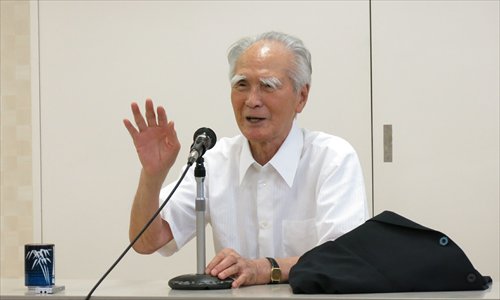A bold statement
Japan’s former prime minister discusses Abe’s upcoming WWII address

Former Prime Minister of Japan Tomiichi Murayama Photo: Li Qian/GT
On August 15, 1995, the 50th anniversary of the end of World War II, then Japanese Prime Minister Tomiichi Murayama outlined his administration's views on WWII in what later became known as "The Murayama Statement."
In this speech Murayama candidly reflected upon Japan's responsibilities to history and apologized for the "tremendous damage and suffering" Japan was responsible for during the war.
To date, the Japanese cabinets that have followed Murayama's have upheld the statement during WWII anniversaries. Now, with the upcoming 70th anniversary of the end of WWII on August 15, the world has turned its attention to how incumbent Prime Minister Shinzo Abe will address the issue.
GT: Japanese Prime Minister Abe said earlier this year that his "Abe Statement" would not repeat key words from your Murayama Statement, such as "colonial rule" and "aggression." If this is the case, do you think this is a betrayal of The Murayama Statement?
Murayama: When Abe first became prime minister [in 2006], he said he would inherit The Murayama Statement. However, during his second term he changed this to " inherit, but not completely." At first, he wanted his speech for the 70th anniversary of the end of WWII to be a cabinet decision, but when things became complicated, he decided to present the speech as coming from himself. For me, the meaning that his speech delivers will be more important than whether or not he uses those words [from The Murayama Statement.] It will be a shame if his speech denies history, because that's the same as the Japanese government telling lies, which will damage Japan's credibility.
GT: If Abe's security bill passes through Japan's Diet, does that mean Japan will have officially left its pacifist path?
Murayama: The United Nations recognizes two levels of self-defense: One is individual self-defense, the other collective self-defense. Japan's constitution guarantees individual self-defense but doesn't recognize collective self-defense, so Japan has so far been exempt from participating in wars. Abe's security bill is aimed at reinterpreting the Constitution to recognize collective self-defense to a certain extent and to expand the range of self-defense. How is that not putting Japan on the road to war? This is why almost the entire nation is against [the security bill] and the Diet is still debating the issue.
GT: A number of unofficial associations in China and Japan have contributed to friendly exchanges between the two countries. How much can this type of unofficial diplomacy complement the stagnant diplomatic relations between the two countries?
Murayama: When exchanges develop between ordinary people and voices in both countries calling to avoid confrontation and war become louder, governments can't just push these voices aside. Unofficial communication is a force that guides the policy of a country and is something that can't be ignored.
GT: Right-wing forces in Japan have questioned the existence of "comfort women" and the use of other terms, but at the same time, there are Japanese lawyers helping war victims in China seek justice. What are your opinions on this?
Murayama: "Comfort women" were a problem created by the Japanese side, so Japan should definitely recognize them. Mr. Yohei Kono [chief cabinet secretary in 1993] investigated the matter before he acknowledged it in "The Kono Statement." His speech concluded that the Japanese government has a responsibility toward these "comfort women." Regardless of what the right-wing claims, the government has no other choice but to acknowledge the truth.
GT: How should Japan react to an ever more confident China?
Murayama: There is nothing to worry about as long as Japan evaluates China objectively. Japan and China should cooperate and communicate with each other and help boost each other.
GT: How will US policies toward Asia influence Sino-Japanese relations?
Murayama: The US wants to see friendly relations, not confrontation, between Japan and China. However, the US military base in Okinawa and other facts do have a negative impact on Japan-China relations. Therefore certain considerations should be explored to achieve a balanced view as to what's beneficial for the two countries. Japan could never just follow the orders of the US.